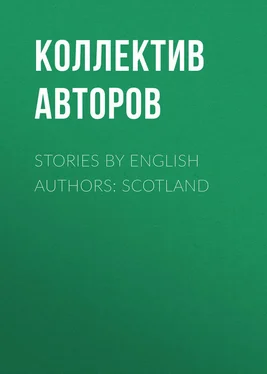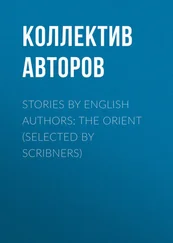Коллектив авторов - Stories by English Authors - Scotland
Здесь есть возможность читать онлайн «Коллектив авторов - Stories by English Authors - Scotland» — ознакомительный отрывок электронной книги совершенно бесплатно, а после прочтения отрывка купить полную версию. В некоторых случаях можно слушать аудио, скачать через торрент в формате fb2 и присутствует краткое содержание. Жанр: foreign_antique, foreign_prose, на английском языке. Описание произведения, (предисловие) а так же отзывы посетителей доступны на портале библиотеки ЛибКат.
- Название:Stories by English Authors: Scotland
- Автор:
- Жанр:
- Год:неизвестен
- ISBN:нет данных
- Рейтинг книги:3 / 5. Голосов: 1
-
Избранное:Добавить в избранное
- Отзывы:
-
Ваша оценка:
- 60
- 1
- 2
- 3
- 4
- 5
Stories by English Authors: Scotland: краткое содержание, описание и аннотация
Предлагаем к чтению аннотацию, описание, краткое содержание или предисловие (зависит от того, что написал сам автор книги «Stories by English Authors: Scotland»). Если вы не нашли необходимую информацию о книге — напишите в комментариях, мы постараемся отыскать её.
Stories by English Authors: Scotland — читать онлайн ознакомительный отрывок
Ниже представлен текст книги, разбитый по страницам. Система сохранения места последней прочитанной страницы, позволяет с удобством читать онлайн бесплатно книгу «Stories by English Authors: Scotland», без необходимости каждый раз заново искать на чём Вы остановились. Поставьте закладку, и сможете в любой момент перейти на страницу, на которой закончили чтение.
Интервал:
Закладка:
Stories by English Authors: Scotland (Selected by Scribners)
THE COURTING OF T’NOWHEAD’S BELL, By J. M. Barrie
For two years it had been notorious in the square that Sam’l Dickie was thinking of courting T’nowhead’s Bell, and that if Little Sanders Elshioner (which is the Thrums pronunciation of Alexander Alexander) went in for her, he might prove a formidable rival. Sam’l was a weaver in the tenements, and Sanders a coal-carter, whose trade-mark was a bell on his horse’s neck that told when coal was coming. Being something of a public man, Sanders had not, perhaps, so high a social position as Sam’l, but he had succeeded his father on the coal-cart, while the weaver had already tried several trades. It had always been against Sam’l, too, that once when the kirk was vacant he had advised the selection of the third minister who preached for it on the ground that it became expensive to pay a large number of candidates. The scandal of the thing was hushed up, out of respect for his father, who was a God-fearing man, but Sam’l was known by it in Lang Tammas’s circle. The coal-carter was called Little Sanders to distinguish him from his father, who was not much more than half his size. He had grown up with the name, and its inapplicability now came home to nobody. Sam’l’s mother had been more far-seeing than Sanders’s. Her man had been called Sammy all his life because it was the name he got as a boy, so when their eldest son was born she spoke of him as Sam’l while still in the cradle. The neighbours imitated her, and thus the young man had a better start in life than had been granted to Sammy, his father.
It was Saturday evening – the night in the week when Auld Licht young men fell in love. Sam’l Dickie, wearing a blue glengarry bonnet with a red ball on the top, came to the door of the one-story house in the tenements, and stood there wriggling, for he was in a suit of tweed for the first time that week, and did not feel at one with them. When his feeling of being a stranger to himself wore off, he looked up and down the road, which straggles between houses and gardens, and then, picking his way over the puddles, crossed to his father’s hen-house and sat down on it. He was now on his way to the square.
Eppie Fargus was sitting on an adjoining dyke knitting stockings, and Sam’l looked at her for a time.
“Is’t yersel’, Eppie?” he said at last.
“It’s a’ that,” said Eppie.
“Hoo’s a’ wi’ ye?” asked Sam’l.
“We’re juist aff an’ on,” replied Eppie, cautiously.
There was not much more to say, but as Sam’l sidled off the hen-house he murmured politely, “Ay, ay.” In another minute he would have been fairly started, but Eppie resumed the conversation.
“Sam’l,” she said, with a twinkle in her eye, “ye can tell Lisbeth Fargus I’ll likely be drappin’ in on her aboot Mununday or Teisday.”
Lisbeth was sister to Eppie, and wife of Tammas McQuhatty, better known as T’nowhead, which was the name of his farm. She was thus Bell’s mistress.
Sam’l leaned against the hen-house as if all his desire to depart had gone.
“Hoo d’ ye kin I’ll be at the T’nowhead the nicht?” he asked, grinning in anticipation.
“Ou, I’se warrant ye’ll be after Bell,” said Eppie.
“Am no sae sure o’ that,” said Sam’l, trying to leer. He was enjoying himself now.
“Am no sure o’ that,” he repeated, for Eppie seemed lost in stitches.
“Sam’l!”
“Ay.”
“Ye’ll be speerin’ her sune noo, I dinna doot?”
This took Sam’l, who had only been courting Bell for a year or two, a little aback.
“Hoo d’ ye mean, Eppie?” he asked.
“Maybe ye’ll do ‘t the nicht.”
“Na, there’s nae hurry,” said Sam’l.
“Weel, we’re a’ coontin’ on ‘t, Sam’l.”
“Gae ‘wa’ wi’ ye.”
“What for no?”
“Gae ‘wa’ wi’ ye,” said Sam’l again.
“Bell’s gei an’ fond o’ ye, Sam’l.”
“Ay,” said Sam’l.
“But am dootin’ ye’re a fell billy wi’ the lasses.”
“Ay, oh, I d’na kin; moderate, moderate,” said Sam’l, in high delight.
“I saw ye,” said Eppie, speaking with a wire in her mouth, “gaein’ on terr’ble wi’ Mysy Haggart at the pump last Saturday.”
“We was juist amoosin’ oorsel’s,” said Sam’l.
“It’ll be nae amoosement to Mysy,” said Eppie, “gin ye brak her heart.”
“Losh, Eppie,” said Sam’l, “I didna think o’ that.”
“Ye maun kin weel, Sam’l, ‘at there’s mony a lass wid jump at ye.”
“Ou, weel,” said Sam’l, implying that a man must take these things as they come.
“For ye’re a dainty chield to look at, Sam’l.”
“Do ye think so, Eppie? Ay, ay; oh, I d’na kin am onything by the ordinar.”
“Ye mayna be,” said Eppie, “but lasses doesna do to be ower-partikler.”
Sam’l resented this, and prepared to depart again.
“Ye’ll no tell Bell that?” he asked, anxiously.
“Tell her what?”
“Aboot me an’ Mysy.”
“We’ll see hoo ye behave yersel’, Sam’l.”
“No ‘at I care, Eppie; ye can tell her gin ye like. I widna think twice o’ tellin’ her mysel’.”
“The Lord forgie ye for leein’, Sam’l,” said Eppie, as he disappeared down Tammy Tosh’s close. Here he came upon Henders Webster.
“Ye’re late, Sam’l,” said Henders.
“What for?”
“Ou, I was thinkin’ ye wid be gaen the length o’ T’nowhead the nicht, an’ I saw Sanders Elshioner makkin’ ‘s wy there an ‘oor syne.”
“Did ye?” cried Sam’l, adding craftily, “but it’s naething to me.”
“Tod, lad,” said Henders, “gin ye dinna buckle to, Sanders’ll be carryin’ her off.”
Sam’l flung back his head and passed on.
“Sam’l!” cried Henders after him.
“Ay,” said Sam’l, wheeling round.
“Gie Bell a kiss frae me.”
The full force of this joke struck neither all at once. Sam’l began to smile at it as he turned down the school-wynd, and it came upon Henders while he was in his garden feeding his ferret. Then he slapped his legs gleefully, and explained the conceit to Will’um Byars, who went into the house and thought it over.
There were twelve or twenty little groups of men in the square, which was lit by a flare of oil suspended over a cadger’s cart. Now and again a staid young woman passed through the square with a basket on her arm, and if she had lingered long enough to give them time, some of the idlers would have addressed her. As it was, they gazed after her, and then grinned to each other.
“Ay, Sam’l,” said two or three young men, as Sam’l joined them beneath the town clock.
“Ay, Davit,” replied Sam’l.
This group was composed of some of the sharpest wits in Thrums, and it was not to be expected that they would let this opportunity pass. Perhaps when Sam’l joined them he knew what was in store for him.
“Was ye lookin’ for T’nowhead’s Bell, Sam’l?” asked one.
“Or mebbe ye was wantin’ the minister?” suggested another, the same who had walked out twice with Chirsty Duff and not married her after all.
Sam’l could not think of a good reply at the moment, so he laughed good-naturedly.
“Ondootedly she’s a snod bit crittur,” said Davit, archly.
“An’ michty clever wi’ her fingers,” added Jamie Deuchars.
“Man, I’ve thocht o’ makkin’ up to Bell mysel’,” said Pete Ogle. “Wid there be ony chance, think ye, Sam’l?”
“I’m thinkin’ she widna hae ye for her first, Pete,” replied Sam’l, in one of those happy flashes that come to some men, “but there’s nae sayin’ but what she micht tak’ ye to finish up wi’.”
Читать дальшеИнтервал:
Закладка:
Похожие книги на «Stories by English Authors: Scotland»
Представляем Вашему вниманию похожие книги на «Stories by English Authors: Scotland» списком для выбора. Мы отобрали схожую по названию и смыслу литературу в надежде предоставить читателям больше вариантов отыскать новые, интересные, ещё непрочитанные произведения.
Обсуждение, отзывы о книге «Stories by English Authors: Scotland» и просто собственные мнения читателей. Оставьте ваши комментарии, напишите, что Вы думаете о произведении, его смысле или главных героях. Укажите что конкретно понравилось, а что нет, и почему Вы так считаете.












